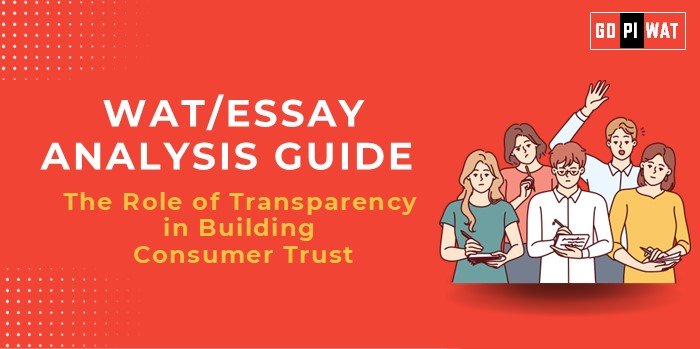📋 Written Ability Test (WAT)/Essay Analysis Guide
🌐 Understanding the Topic’s Importance
Transparency has become integral to business ethics in an age of information accessibility. It connects deeply with themes of sustainability, governance, and consumer rights—key areas for B-school discussions.
🕒 Effective Planning and Writing
- Time Allocation:
- Planning: 5 minutes
- Writing: 20 minutes
- Review: 5 minutes
💡 Introduction Techniques for Essays
- Contrast Approach: “In a world where data breaches are rampant, organizations practicing transparency have gained unparalleled consumer trust.”
- Solution-Based Approach: “Transparency bridges the gap between consumer expectations and corporate practices, fostering trust and loyalty.”
- Timeline Introduction: “From the rise of ESG reporting in the 2010s to today’s blockchain-powered transparency, consumer expectations have evolved significantly.”
📊 Structuring the Essay Body
- Achievements: Highlight success stories like Patagonia and Starbucks, supported by data.
- Challenges: Discuss barriers like cost implications and greenwashing risks, with global references.
- Future Outlook: Suggest initiatives like blockchain for transparency in supply chains.
📝 Concluding Effectively
- Balanced Conclusion: “Transparency, while challenging to implement, remains critical for building trust in today’s consumer-centric market.”
- Global Comparison Conclusion: “As transparency standards evolve globally, organizations that adapt will thrive in the competitive marketplace.”
🚀 Recommendations for Sustainable Progress
- Invest in technologies like blockchain to verify claims.
- Educate consumers about the nuances of transparency.
- Collaborate with regulators to define clear standards.
✨ Sample Short Essays
🏅 Balanced Perspective
“Transparency has emerged as a vital tool for earning consumer trust. While companies like Starbucks demonstrate its success, challenges such as operational costs and greenwashing persist. The future of transparency lies in leveraging technologies like blockchain for verified disclosures.”
🏅 Solution-Oriented
“Companies that embrace transparency enhance trust and loyalty. However, greenwashing erodes these efforts. Addressing this challenge through consumer education and regulatory collaboration can make transparency a cornerstone of business ethics.”
🏅 Global Comparison
“Transparency builds trust, as seen in the EU’s stringent GDPR regulations. However, global disparities in its adoption highlight the need for universal benchmarks to ensure consumer trust worldwide.”


